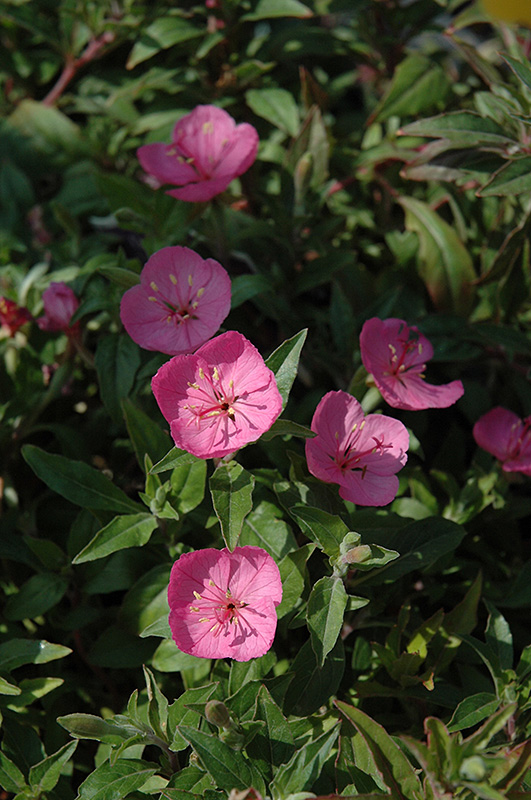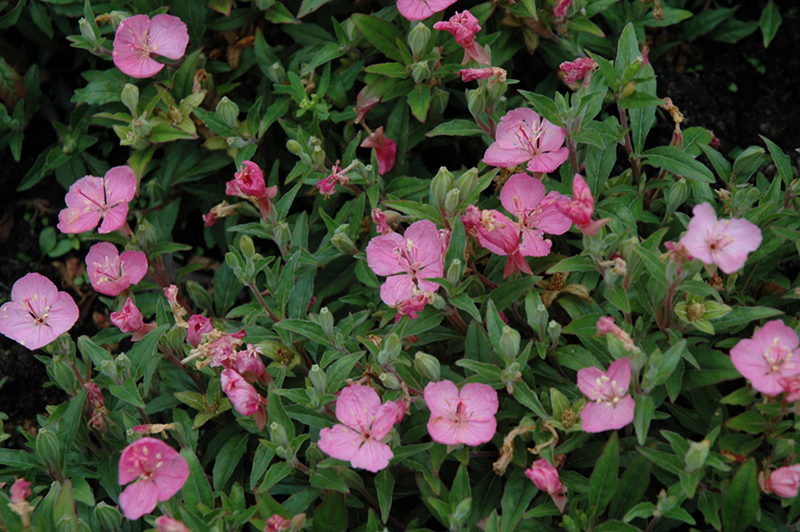Plant Library
Growing Magenta Dwarf Sundrops
Oenothera 'Glowing Magenta'
Plant Height: 6 inches
Flower Height: 12 inches
Spacing: 10 inches
Sunlight:
![]()
![]()
Hardiness Zone: 6
Description:
Blooms profusely all summer long and into the fall; mounds of glossy foliage covered with dark-pink flowers; short-lived but worth planting
Ornamental Features
Growing Magenta Dwarf Sundrops has masses of beautiful lightly-scented hot pink flowers at the ends of the stems from early summer to early fall, which are most effective when planted in groupings. Its glossy narrow leaves remain emerald green in color throughout the season.
Landscape Attributes
Growing Magenta Dwarf Sundrops is an herbaceous perennial with a ground-hugging habit of growth. Its medium texture blends into the garden, but can always be balanced by a couple of finer or coarser plants for an effective composition.
This plant will require occasional maintenance and upkeep, and is best cleaned up in early spring before it resumes active growth for the season. Gardeners should be aware of the following characteristic(s) that may warrant special consideration;
- Spreading
Growing Magenta Dwarf Sundrops is recommended for the following landscape applications;
- Mass Planting
- Rock/Alpine Gardens
- Border Edging
- General Garden Use
- Groundcover
- Naturalizing And Woodland Gardens
Planting & Growing
Growing Magenta Dwarf Sundrops will grow to be only 6 inches tall at maturity extending to 12 inches tall with the flowers, with a spread of 12 inches. When grown in masses or used as a bedding plant, individual plants should be spaced approximately 10 inches apart. Its foliage tends to remain low and dense right to the ground. It grows at a medium rate, and under ideal conditions can be expected to live for approximately 10 years. As an herbaceous perennial, this plant will usually die back to the crown each winter, and will regrow from the base each spring. Be careful not to disturb the crown in late winter when it may not be readily seen!
This plant does best in full sun to partial shade. It prefers dry to average moisture levels with very well-drained soil, and will often die in standing water. It is considered to be drought-tolerant, and thus makes an ideal choice for a low-water garden or xeriscape application. It is not particular as to soil pH, but grows best in sandy soils. It is somewhat tolerant of urban pollution. This particular variety is an interspecific hybrid. It can be propagated by division; however, as a cultivated variety, be aware that it may be subject to certain restrictions or prohibitions on propagation.
This plant is not reliably hardy in most areas of east Idaho. Please contact us for more information.
Disclaimer - This Plant Finder tool is an online resource representing many of the varieties that we carry over the course of the season, and is intended for informational purposes only. Inventory varies seasonally, so we cannot guarantee that every plant will be in stock at all times - please contact the store directly for availability. It does not include our entire inventory of plants, so be sure to visit our store to see varieties that may not be represented on this list.




